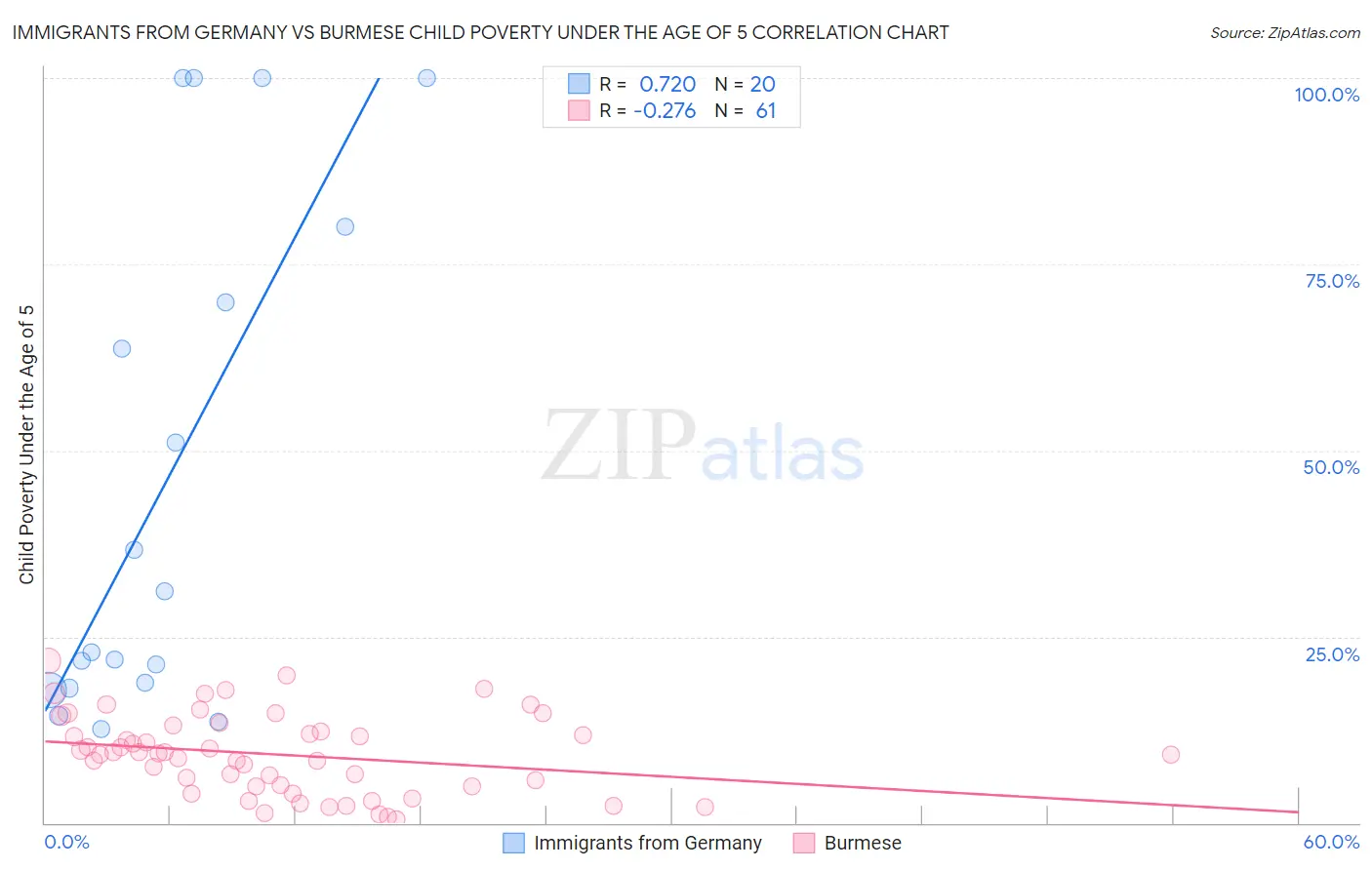Immigrants from Germany vs Burmese Child Poverty Under the Age of 5
COMPARE
Immigrants from Germany
Burmese
Child Poverty Under the Age of 5
Child Poverty Under the Age of 5 Comparison
Immigrants from Germany
Burmese
17.4%
CHILD POVERTY UNDER THE AGE OF 5
41.0/ 100
METRIC RATING
181st/ 347
METRIC RANK
13.2%
CHILD POVERTY UNDER THE AGE OF 5
100.0/ 100
METRIC RATING
10th/ 347
METRIC RANK
Immigrants from Germany vs Burmese Child Poverty Under the Age of 5 Correlation Chart
The statistical analysis conducted on geographies consisting of 440,983,234 people shows a strong positive correlation between the proportion of Immigrants from Germany and poverty level among children under the age of 5 in the United States with a correlation coefficient (R) of 0.720 and weighted average of 17.4%. Similarly, the statistical analysis conducted on geographies consisting of 442,195,758 people shows a weak negative correlation between the proportion of Burmese and poverty level among children under the age of 5 in the United States with a correlation coefficient (R) of -0.276 and weighted average of 13.2%, a difference of 31.5%.

Child Poverty Under the Age of 5 Correlation Summary
| Measurement | Immigrants from Germany | Burmese |
| Minimum | 12.7% | 0.42% |
| Maximum | 100.0% | 21.8% |
| Range | 87.3% | 21.3% |
| Mean | 45.8% | 9.2% |
| Median | 27.0% | 9.3% |
| Interquartile 25% (IQ1) | 18.5% | 4.9% |
| Interquartile 75% (IQ3) | 74.9% | 12.7% |
| Interquartile Range (IQR) | 56.4% | 7.8% |
| Standard Deviation (Sample) | 33.9% | 5.3% |
| Standard Deviation (Population) | 33.0% | 5.2% |
Similar Demographics by Child Poverty Under the Age of 5
Demographics Similar to Immigrants from Germany by Child Poverty Under the Age of 5
In terms of child poverty under the age of 5, the demographic groups most similar to Immigrants from Germany are Arab (17.4%, a difference of 0.030%), Hawaiian (17.4%, a difference of 0.050%), South American Indian (17.4%, a difference of 0.050%), Lebanese (17.4%, a difference of 0.070%), and Immigrants from Cameroon (17.4%, a difference of 0.18%).
| Demographics | Rating | Rank | Child Poverty Under the Age of 5 |
| Immigrants | Saudi Arabia | 50.0 /100 | #174 | Average 17.2% |
| Immigrants | Lebanon | 47.6 /100 | #175 | Average 17.3% |
| Immigrants | Iraq | 45.2 /100 | #176 | Average 17.3% |
| Immigrants | Sierra Leone | 43.6 /100 | #177 | Average 17.3% |
| Immigrants | Cameroon | 42.7 /100 | #178 | Average 17.4% |
| Hawaiians | 41.5 /100 | #179 | Average 17.4% |
| South American Indians | 41.4 /100 | #180 | Average 17.4% |
| Immigrants | Germany | 41.0 /100 | #181 | Average 17.4% |
| Arabs | 40.7 /100 | #182 | Average 17.4% |
| Lebanese | 40.3 /100 | #183 | Average 17.4% |
| Immigrants | Costa Rica | 39.0 /100 | #184 | Fair 17.4% |
| Immigrants | Armenia | 38.0 /100 | #185 | Fair 17.5% |
| Immigrants | Bosnia and Herzegovina | 35.0 /100 | #186 | Fair 17.5% |
| Kenyans | 34.7 /100 | #187 | Fair 17.5% |
| Carpatho Rusyns | 33.6 /100 | #188 | Fair 17.5% |
Demographics Similar to Burmese by Child Poverty Under the Age of 5
In terms of child poverty under the age of 5, the demographic groups most similar to Burmese are Immigrants from Korea (13.2%, a difference of 0.11%), Immigrants from South Central Asia (13.3%, a difference of 0.21%), Bhutanese (13.4%, a difference of 0.96%), Immigrants from Iran (13.1%, a difference of 1.1%), and Iranian (13.1%, a difference of 1.3%).
| Demographics | Rating | Rank | Child Poverty Under the Age of 5 |
| Filipinos | 100.0 /100 | #3 | Exceptional 11.6% |
| Thais | 100.0 /100 | #4 | Exceptional 12.3% |
| Immigrants | Hong Kong | 100.0 /100 | #5 | Exceptional 12.4% |
| Immigrants | Singapore | 100.0 /100 | #6 | Exceptional 12.9% |
| Chinese | 100.0 /100 | #7 | Exceptional 13.1% |
| Iranians | 100.0 /100 | #8 | Exceptional 13.1% |
| Immigrants | Iran | 100.0 /100 | #9 | Exceptional 13.1% |
| Burmese | 100.0 /100 | #10 | Exceptional 13.2% |
| Immigrants | Korea | 100.0 /100 | #11 | Exceptional 13.2% |
| Immigrants | South Central Asia | 100.0 /100 | #12 | Exceptional 13.3% |
| Bhutanese | 100.0 /100 | #13 | Exceptional 13.4% |
| Okinawans | 100.0 /100 | #14 | Exceptional 13.4% |
| Indians (Asian) | 100.0 /100 | #15 | Exceptional 13.4% |
| Immigrants | Eastern Asia | 100.0 /100 | #16 | Exceptional 13.5% |
| Assyrians/Chaldeans/Syriacs | 100.0 /100 | #17 | Exceptional 13.6% |